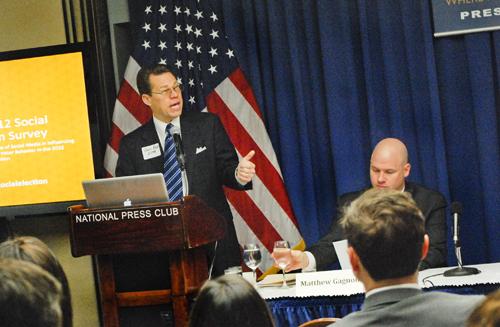
This post was written by Hatchet staff writer Delaney Walsh.
The majority of Americans rely just as much on social media as traditional press to follow politics, according to research performed by the Graduate School of Political Management before the 2012 presidential election.
The study found that although social media is not the primary forum for voters to educate themselves about candidates and issues, it has pushed people to share and shape their opinions based on their online friends or followers.
David Rehr, a part-time professor in GSPM, and John Kagia, the director of strategy and insight for the research firm ORI Results, led a team of GSPM professors in the study of 806 people. The results were released Friday at the National Press Club.
Because of user’s personal connections on social media, many view sites like Twitter, Facebook and Tumblr as a higher-quality sources of information than in the past, according to the survey results. Sixty-three percent of respondents said they found social media equally or more credible than traditional media, a sign of the waning influence of newspapers and broadcast news.
“The implications for our broader political lives – political advocacy, civic engagement, business – are huge,” Kagia said.
The research was some of the first to track an election that attracted a flurry of memes and hashtags after debates and campaign rallies.
Rehr and Kagia started the project after noting that social media activity around the 2012 election differed from the previous one, when Twitter was in its infancy.
Kagia cited Obama’s response to Clint Eastwood’s “empty chair speech” at the Republican National Convention as a hallmark of the more interactive role they saw social media play this election cycle.
The president’s social media staffers responded to Eastwood’s criticism with a viral hit: a tweet saying “This seat’s taken,” accompanied by a photo of the president seated in the Oval Office and a donation link.
The analysis also comes as GSPM tries to pump up its research portfolio, part of the director Mark Kennedy growth plan for the professional school.




